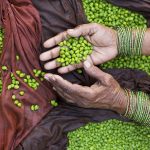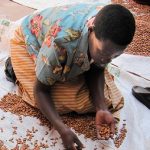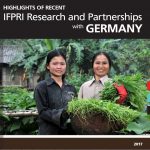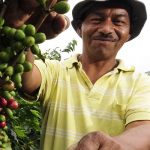The mid-1990s economic crisis in Latin America threatened to sharply increase poverty and left many people vulnerable. In response, governments in Latin America developed and implemented innovative social protection programs in the form of conditional cash transfers (CCTs). To examine the impact of these programs, several governments called on IFPRI to conduct rigorous evaluations. IFPRI’s >> Read more
Leveraging Agriculture for Nutrition in South Asia (LANSA)
Agriculture is the primary livelihood for nearly half the population of South Asia, and yet its potential to reduce undernutrition remains unrealized. One-third of children in South Asia are stunted. Despite increasing political will to improve nutrition, evidence has been sparse on how agriculture and agrifood systems can be better designed to improve nutrition. In 2012, a research consortium called Leveraging Agriculture for Nutrition in South Asia (LANSA) was formed among the Collective on Social Science Research in Pakistan, BRAC, the Leverhulme Centre for Integrated Research on Agriculture and Health (LCIRAH), the Institute of Development Studies (IDS), and IFPRI, under the leadership of the M.S. Swaminathan Research Foundation and with support from UK's Department for International Development (DFID). The aim was to generate evidence to strengthen the nutrition sensitivity of agrifood systems in Afghanistan, Bangladesh, India, and Pakistan.
HarvestPlus: Addressing Nutritional Challenges through Zinc Rice
In Bangladesh, 41 percent of children under five are estimated to be zinc deficient according to the Bangladesh Demography Survey, and the country loses over US$700 million in gross domestic product due to vitamin and mineral deficiencies according to the World Bank. Faced with such deficiencies in nutrition and productivity, HarvestPlus, in partnership with the European Commission and the IFPRI-led CGIAR Research Program on Agriculture for Nutrition and Health (A4NH), worked closely with the Bangladesh Rice Research Institute (BRRI), the International Rice Research Institute, and 30 other partners to develop three rice varieties fortified with zinc.
Tracking Hunger and Strengthening Resilience: An IFPRI-Germany Partnership towards Sustainable Development
IFPRI has been partnering with German development agencies, universities, and nongovernmental organizations (NGOs) for more than three decades to build the evidence base needed to effectively tackle pressing development issues.
Highlights of Recent IFPRI Research and Partnerships with Germany
This brochure highlights key research collaborations between IFPRI and German institutions in recent years. For more than three decades, the International Food Policy Research Institute (IFPRI) has engaged in strong partnerships with German development agencies, universities, and nongovernmental organizations (NGOs) to build the evidence base needed to effectively tackle pressing development issues. Initially, IFPRI and >> Read more
Informing Development Strategies in Latin America and the Caribbean
For more than three decades, IFPRI's research and collaborations in the Latin America and Caribbean (LAC) region have produced rigorous evidence leading to innovative market and trade policies and effective social protection and nutritional programs.
- « Previous Page
- 1
- 2
- 3
- 4
- 5
- …
- 10
- Next Page »




